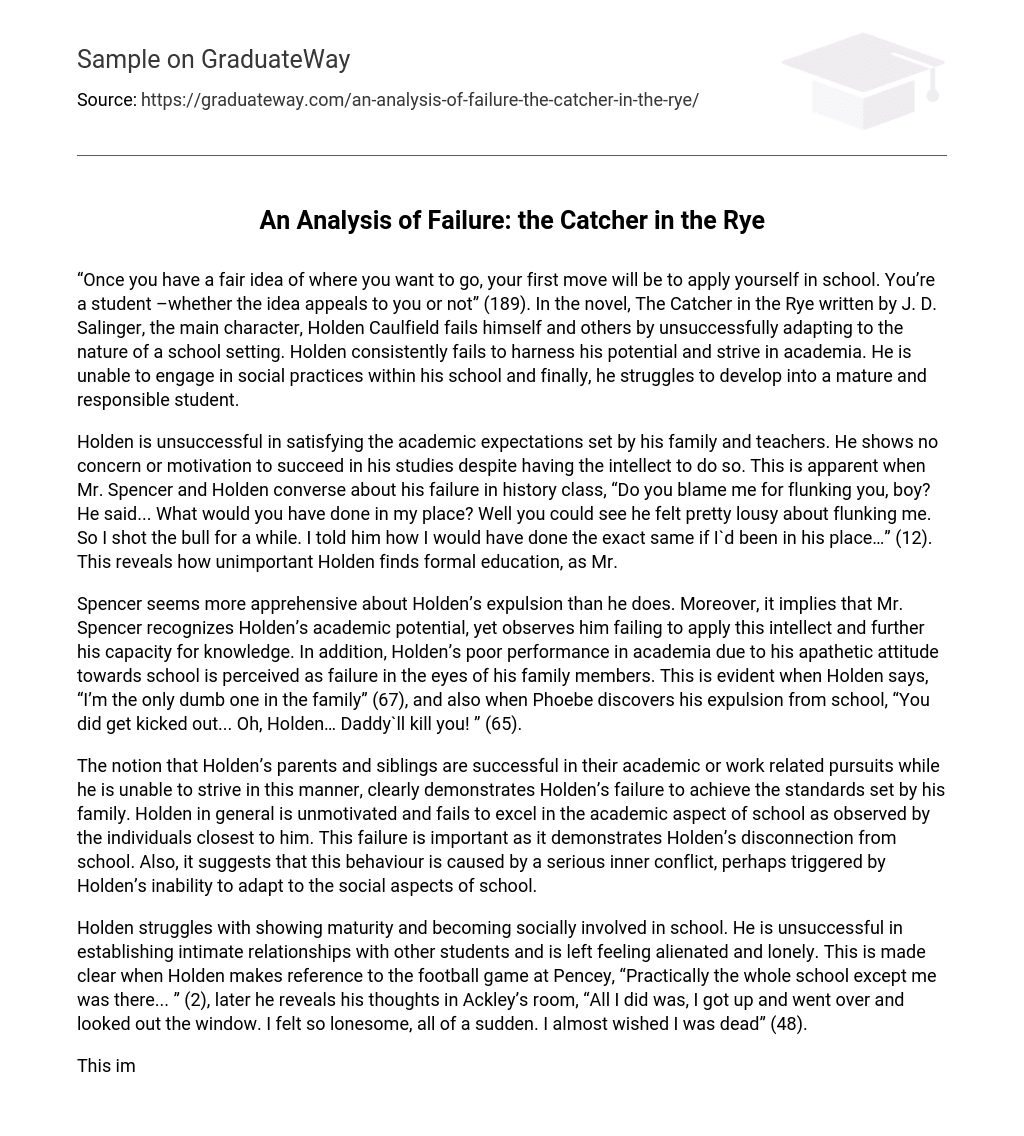“Once you have a fair idea of where you want to go, your first move will be to apply yourself in school. You’re a student –whether the idea appeals to you or not” (189). In the novel, The Catcher in the Rye written by J. D. Salinger, the main character, Holden Caulfield fails himself and others by unsuccessfully adapting to the nature of a school setting. Holden consistently fails to harness his potential and strive in academia. He is unable to engage in social practices within his school and finally, he struggles to develop into a mature and responsible student.
Holden is unsuccessful in satisfying the academic expectations set by his family and teachers. He shows no concern or motivation to succeed in his studies despite having the intellect to do so. This is apparent when Mr. Spencer and Holden converse about his failure in history class, “Do you blame me for flunking you, boy? He said… What would you have done in my place? Well you could see he felt pretty lousy about flunking me. So I shot the bull for a while. I told him how I would have done the exact same if I`d been in his place…” (12). This reveals how unimportant Holden finds formal education, as Mr.
Spencer seems more apprehensive about Holden’s expulsion than he does. Moreover, it implies that Mr. Spencer recognizes Holden’s academic potential, yet observes him failing to apply this intellect and further his capacity for knowledge. In addition, Holden’s poor performance in academia due to his apathetic attitude towards school is perceived as failure in the eyes of his family members. This is evident when Holden says, “I’m the only dumb one in the family” (67), and also when Phoebe discovers his expulsion from school, “You did get kicked out… Oh, Holden… Daddy`ll kill you! ” (65).
The notion that Holden’s parents and siblings are successful in their academic or work related pursuits while he is unable to strive in this manner, clearly demonstrates Holden’s failure to achieve the standards set by his family. Holden in general is unmotivated and fails to excel in the academic aspect of school as observed by the individuals closest to him. This failure is important as it demonstrates Holden’s disconnection from school. Also, it suggests that this behaviour is caused by a serious inner conflict, perhaps triggered by Holden’s inability to adapt to the social aspects of school.
Holden struggles with showing maturity and becoming socially involved in school. He is unsuccessful in establishing intimate relationships with other students and is left feeling alienated and lonely. This is made clear when Holden makes reference to the football game at Pencey, “Practically the whole school except me was there… ” (2), later he reveals his thoughts in Ackley’s room, “All I did was, I got up and went over and looked out the window. I felt so lonesome, all of a sudden. I almost wished I was dead” (48).
This implies that despite being surrounded by students of a similar age and having the opportunity to engage in school events, Holden is still incapable of connecting with others on a personal level. Consequently, he fails himself by unsuccessfully forming intimate relationships with others, which appears to be the only remedy to overcome Holden’s state of isolation. This failure is important as it appears to have a profound effect on Holden’s and thus contributes to his apathetic attitude towards academics and explains his deviation from the norms of school.
Finally, Holden is not able to meet the demands of formal education by failing to develop into the mature and responsible student that Pencey and other schools attempt to mould him into. This is apparent when Holden recognizes his own immaturity and says, “I still act sometimes like I was only about twelve. Everybody says that, especially my father. It’s partly true, too…” ( 9). This quality is also evidenced when Luce converses with Holden and says, “Same old Caulfield. When are you going to grow up? (144). Despite having spent numerous years in school, Holden has still failed to effectively transition from adolescence to adulthood throughout his educational career and thus seems to have characteristics similar to that of a far younger student. Moreover, this lack of maturity hinders Holden’s ability to maintain and further relationships with other students. Overall, Holden epitomizes the inability to successfully develop into a mature and socially engaged student as perceived by his family and friends.
In the novel, The Catcher in the Rye, Holden Caulfield is unable to integrate into a school setting and is consequently seen as a failure to himself and to others. He is unsuccessful in meeting the academic demands of formal education. Holden also struggles to mature and establish personal relationships with other students. J. D Salinger, throughout this novel, addresses the notion of failure and by doing so, informs his readers of the level of importance that society places on performing well in school.





